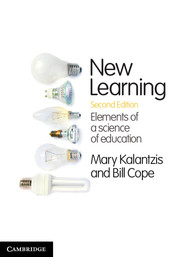Book contents
- Frontmatter
- Contents
- Introduction
- Part A Introduction
- Part B Contexts
- Part C Responses
- Chapter 6 The nature of learning
- Chapter 7 Knowledge and learning
- Chapter 8 Pedagogy and curriculum
- Chapter 9 Learning communities at work
- Chapter 10 Measuring learning
- References and further reading
- Index
- Acknowledgements
Chapter 10 - Measuring learning
Published online by Cambridge University Press: 05 February 2013
- Frontmatter
- Contents
- Introduction
- Part A Introduction
- Part B Contexts
- Part C Responses
- Chapter 6 The nature of learning
- Chapter 7 Knowledge and learning
- Chapter 8 Pedagogy and curriculum
- Chapter 9 Learning communities at work
- Chapter 10 Measuring learning
- References and further reading
- Index
- Acknowledgements
Summary
Overview
This chapter investigates how learning is measured. This is something that is sometimes discussed, depending on one’s perspective, as a question of science, politics or educational fashion. It begins by examining the first modern forms of measurement: tests of intelligence and knowledge, typical of the era of didactic pedagogy. In the third quarter of the twentieth century, a movement to measure ‘standards’ emerges that begins to challenge older ideas about innate intelligence and the priority of memory work. In this time, the fields of educational evaluation and research became well established as integral aspects of education. Most recently, new media for accessing and creating knowledge have opened possibilities for ‘synergistic feedback’ in learning environments, which give learners on-the-fly responses that support their learning and give teachers detailed information about learner needs and progress.
Education assessment, evaluation and research
In public debates about the future of education, the question of measuring learning figures prominently. How much feedback do students get about their learning, and how useful is it? How do parents know how well their children are doing at school? How do we know how well teachers are teaching? How do we know whether one pedagogical approach, curriculum design or institutional setup in an education community is better than any other, and how do we get the information we need to choose amongst alternatives? How do we know whether the resources being put into education are well spent? Could they be spent better? How do we know what works to produce learning. Can educational measurement be an exact science?
Information
- Type
- Chapter
- Information
- New LearningElements of a Science of Education, pp. 305 - 341Publisher: Cambridge University PressPrint publication year: 2012
